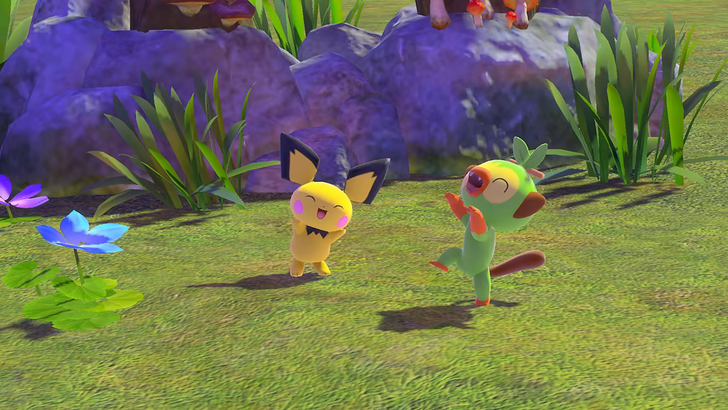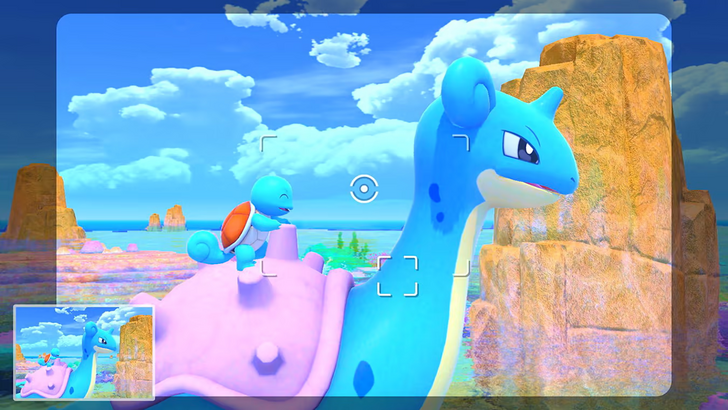 Nintendo makes history in China with the launch of New Pokémon Snap, marking the first official Pokémon game release in the country. This article explores the significance of this event and the broader implications for Nintendo's strategy in China.
Nintendo makes history in China with the launch of New Pokémon Snap, marking the first official Pokémon game release in the country. This article explores the significance of this event and the broader implications for Nintendo's strategy in China.
New Pokémon Snap Launches in China
A Historic Release: Pokémon's Debut in China
 The July 16th release of New Pokémon Snap—a title initially launched globally on April 30, 2021—represents a landmark achievement. It's the first official Pokémon game to reach Chinese consumers since the country's video game console ban, enacted in 2000 and lifted in 2015. This ban, stemming from concerns about the impact of gaming consoles on children's development, had previously prevented official Pokémon releases. This launch signals a significant shift for Nintendo and Pokémon fans in China.
The July 16th release of New Pokémon Snap—a title initially launched globally on April 30, 2021—represents a landmark achievement. It's the first official Pokémon game to reach Chinese consumers since the country's video game console ban, enacted in 2000 and lifted in 2015. This ban, stemming from concerns about the impact of gaming consoles on children's development, had previously prevented official Pokémon releases. This launch signals a significant shift for Nintendo and Pokémon fans in China.
Nintendo's ambition to expand into the vast Chinese gaming market is well-documented. Their 2019 partnership with Tencent to bring the Nintendo Switch to China laid the groundwork for this momentous release. New Pokémon Snap's arrival marks a key step in Nintendo's strategy to penetrate one of the world's most lucrative gaming markets. This strategic move coincides with Nintendo's growing presence in China, with further high-profile game releases planned.
Upcoming Nintendo Titles in China
 Following New Pokémon Snap, Nintendo has confirmed several additional titles for the Chinese market, including:
Following New Pokémon Snap, Nintendo has confirmed several additional titles for the Chinese market, including:
⚫︎ Super Mario 3D World + Bowser’s Fury ⚫︎ Pokémon Let’s Go, Eevee and Pikachu ⚫︎ The Legend of Zelda: Breath of the Wild ⚫︎ Immortals Fenyx Rising ⚫︎ Above Qimen ⚫︎ Samurai Shodown
These releases underscore Nintendo's commitment to building a comprehensive gaming portfolio in China, aiming to capture a significant market share with both established franchises and new offerings.
Pokémon's Unexpected Chinese Legacy
 The surprise among international Pokémon fans regarding China's long-standing console ban highlights the unique history of the franchise in the region. Despite the ban, Pokémon cultivated a substantial fanbase in China, with players often resorting to overseas purchases or encountering counterfeit games. Smuggling attempts were also prevalent; a recent example involved a woman smuggling 350 Nintendo Switch games.
The surprise among international Pokémon fans regarding China's long-standing console ban highlights the unique history of the franchise in the region. Despite the ban, Pokémon cultivated a substantial fanbase in China, with players often resorting to overseas purchases or encountering counterfeit games. Smuggling attempts were also prevalent; a recent example involved a woman smuggling 350 Nintendo Switch games.
A noteworthy attempt to introduce Nintendo hardware to China without explicit branding was the iQue Player, a collaboration between Nintendo and iQue launched in the early 2000s. This compact Nintendo 64 variant aimed to combat rampant piracy.
 The remarkable global success of Pokémon, achieved without official access to the Chinese market, is truly impressive. Nintendo's recent actions signify a strategic shift, aiming to capitalize on the previously untapped potential of the Chinese market.
The remarkable global success of Pokémon, achieved without official access to the Chinese market, is truly impressive. Nintendo's recent actions signify a strategic shift, aiming to capitalize on the previously untapped potential of the Chinese market.
The gradual introduction of Pokémon and other Nintendo titles to China marks a pivotal moment. As Nintendo navigates this complex market, the enthusiasm surrounding these releases suggests a bright future for gaming in China and beyond.




























